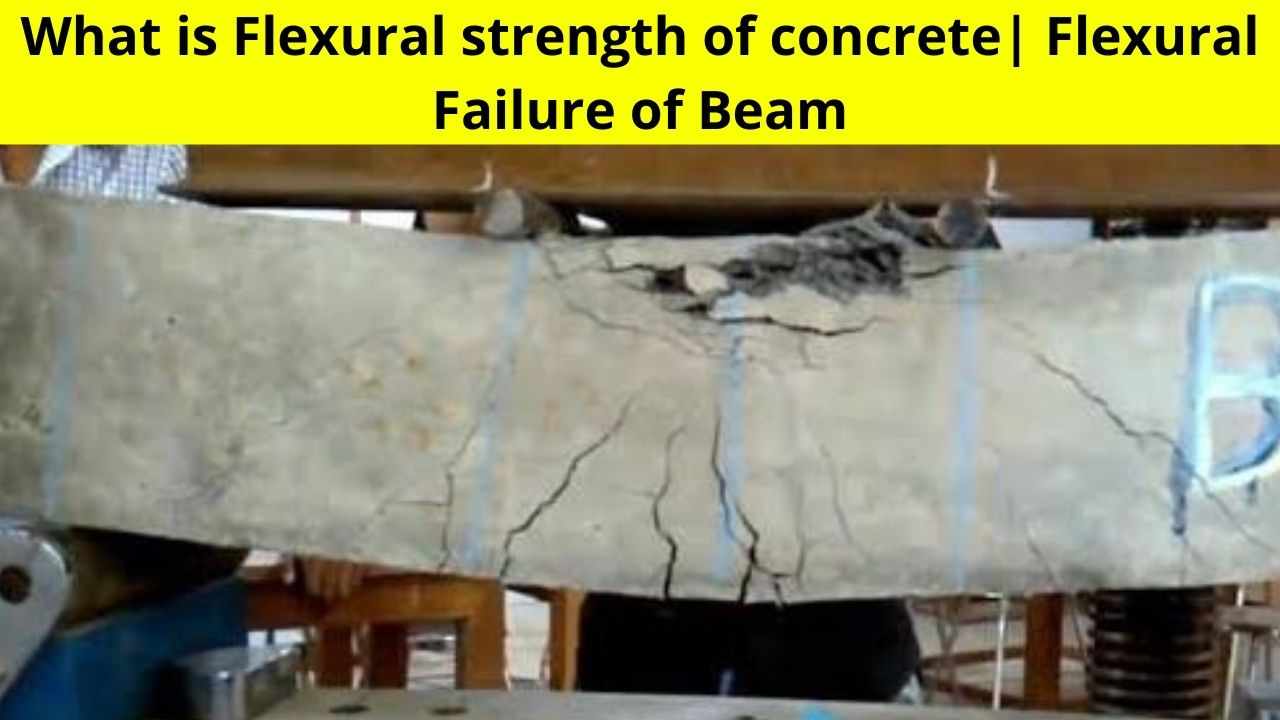In this article, we explain what is flexural strength of concrete, Formula of flexural strength of concrete as per IS 456, how to determine flexural strength of concrete, etc.
So read the article till the end.
Table of Contents
What is Flexural strength of concrete?
Let’s first understand the concept,
The concrete section is divided into two parts by the help of imaginary line that is Neutral axis.
At Neutral Axis, the compressive stress or tensile stress will be zero.
The compressive stress should be maximum at top of beam section above the neutral axis. While, the tensile stress should be maximum at the bottom of beam section that is below the neutral axis.
The amount of stress taken by the concrete of tensile portion that is below the neutral axis portion, is the modulus of rupture of concrete.
Also Check: How to Calculate size of Expansion Joint in Building?
Explanation of Flexural strength of concrete
Consider a beam which is under a heavy gravity loads & these load develop stress in beam.
Now, due to load, beam try to deflect.
The deflection of beam develop a tensile stress at lower part of beam, while a compressive stress at top of beam section.
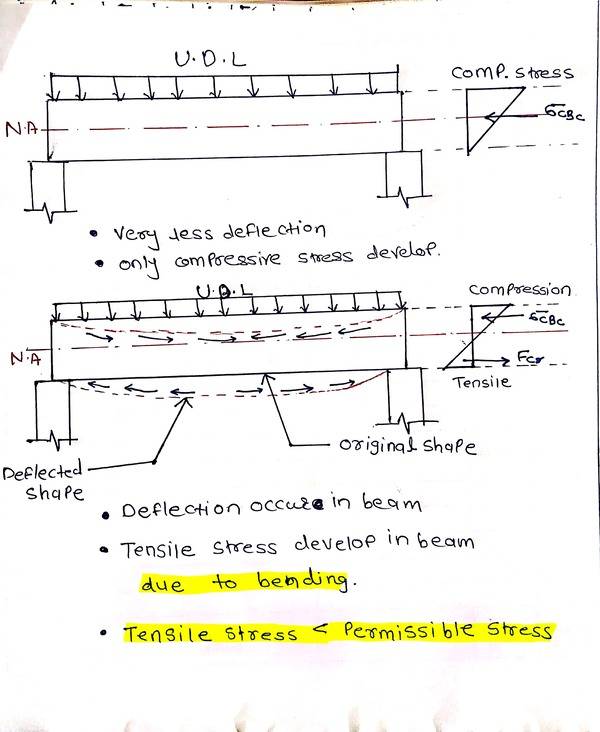
The concrete above the neutral axis is subjected to compressive stress, that’s why it is called as a compressive zone of beam.
While, the concrete below the neutral axis is subjected to tensile stress, that’s why it is called as a tensile zone of beam.
The compressive &tension zone of concrete allow some permissible stress in beam. If the stress exceeds the permissible value, start cracking in beam.
Also Check: Ductile Detailing of Beam as per IS 13920
Definition of Flexural strength of concrete | Modulus of Rupture
The ultimate tensile stress (due to bending) taken by the concrete of tension zone of beam is known as the flexural strength of concrete.
Flexural strength is also known as Modulus of rupture of concrete or Bend strength of concrete or transverse rupture of concrete.
If the tensile stress in a concrete exceeds it’s permissible limit, causes cracks at the bottom face of beam.
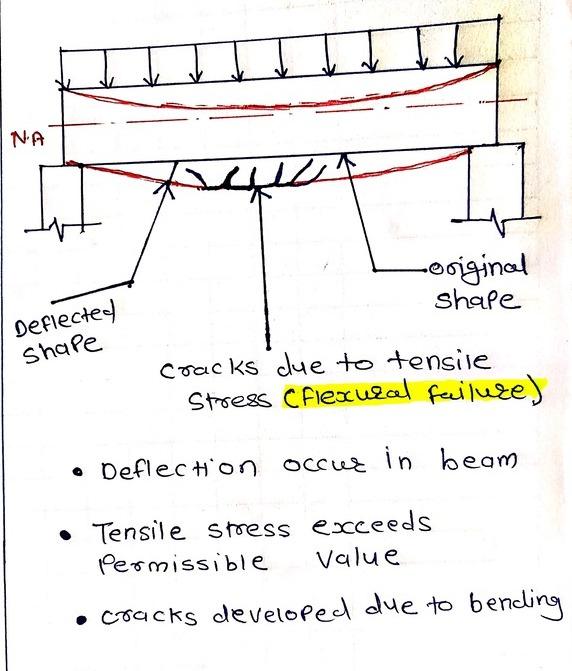
The cracking of beam due to bending tensile stress is known as a flexural failure of beam.
Formula of Flexural strength of concrete
Formula of Flexural Strength of Concrete as per IS 456
For the designing purpose, Indian standard (IS 456) recommend for modulus of rupture of concrete should be give below.
Flexural strength of concrete = 0.7 x √fck
Where, fck = characteristics strength of concrete.
Formula of Flexural Strength of Concrete as per ACI Code 318
For the designing purpose, American standard (ACI 318) recommend for modulus of rupture of concrete should be give below.
Flexural Strength of Concrete = 7.5 λ √f’c in psi
Flexural Strength of Concrete = 0.62 λ √f’c in N/mm2
Where,
λ = 1 for Normal Weight Concrete, 0.85 for Sand Lightweight Concrete, 0.75 for all Light Weight Concrete
Permissible Stress in Concrete
| Fck | Direct Tension | Bending Tension | Direct Compression | Bending Compression |
|---|---|---|---|---|
| 15 | 2 | 2.71 | 4 | 5 |
| 20 | 2.6 | 3.13 | 5 | 7 |
| 25 | 3.2 | 3.5 | 6 | 8.5 |
| 30 | 3.6 | 3.83 | 8 | 10 |
| 35 | 4 | 4.24 | 9 | 11.513 |
| 40 | 4.4 | 4.42 | 10 | 13 |
Also Read: Why Doubly Reinforced concrete beam is less economical
How to determine flexural strength of concrete?
Apparatus:
- Universal testing machine
- Beam moulds
- Tamping bars
- 4 steel rollers
- Scoop and trowel
- Electronic weighing machine
Procedure:
It is determine by central point loading or two point loading.
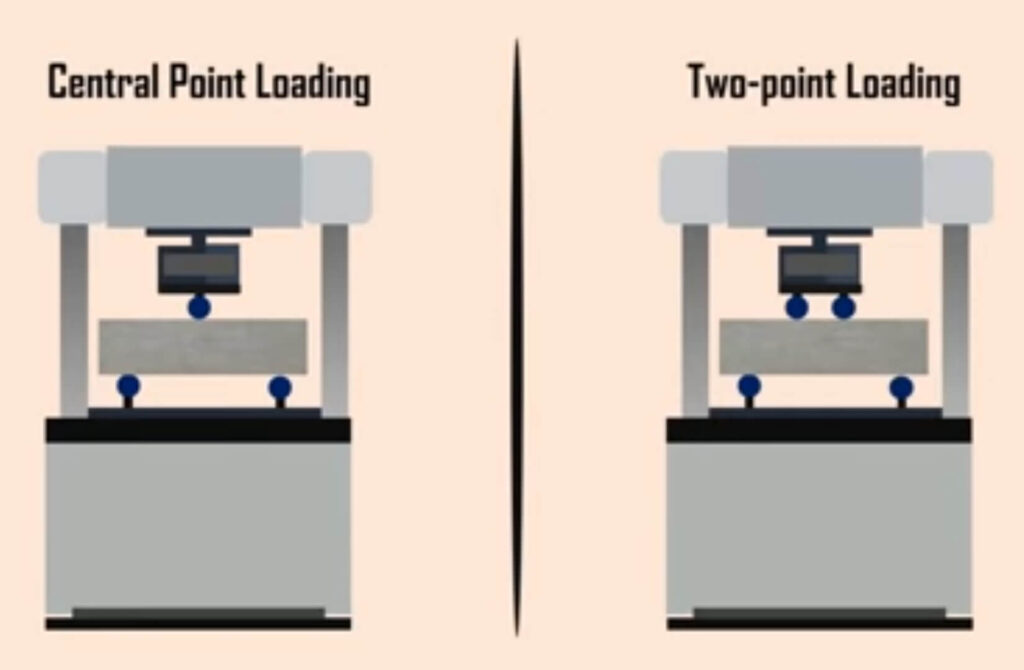
150mmx150mmx700mm size concrete specimen used in this test.
The bead of the machine provided with two steel rollers which have 38mm diameter.
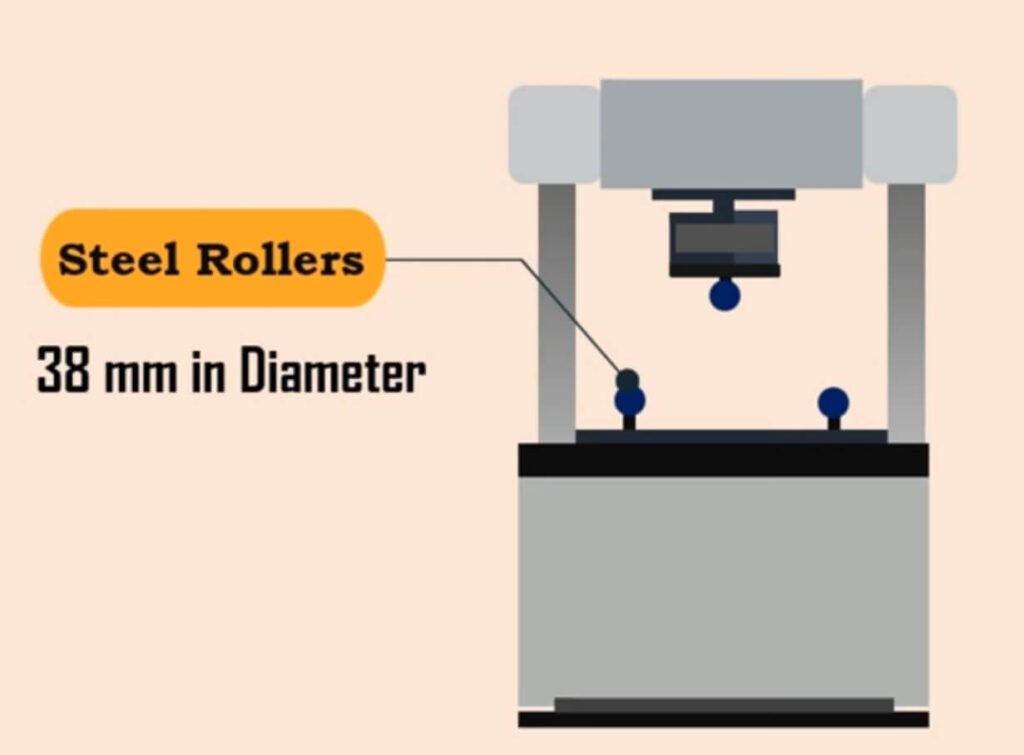
These roller are mounted at 400 mm center to center for 100mm concrete specimen, and 600mm center to center for 150 mm concrete specimen.
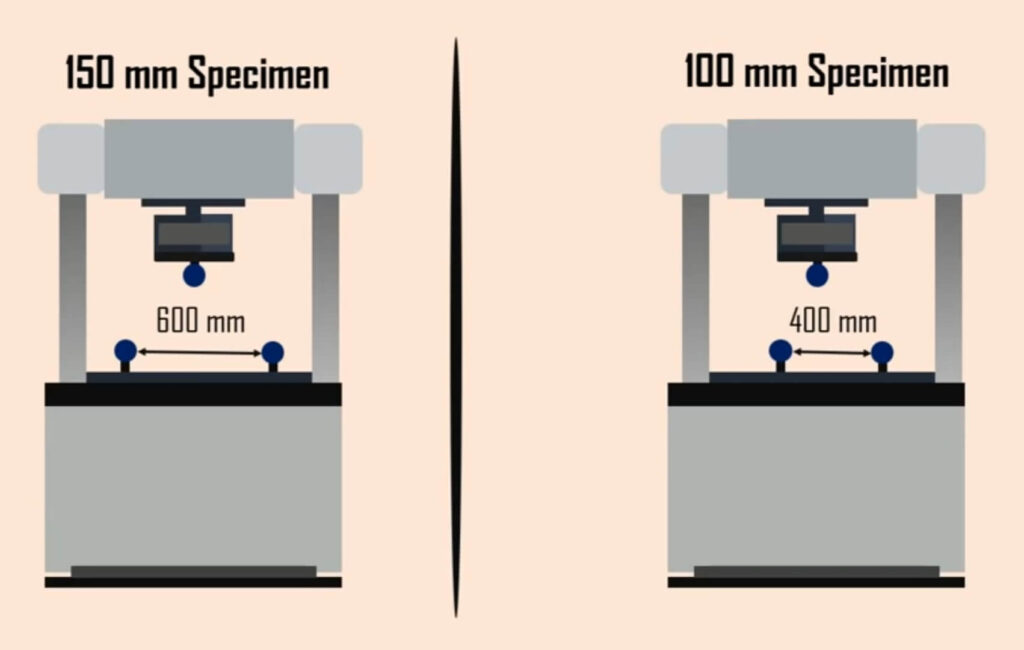
The point load applied through steel roller which is mounted at the top of machine. It’s diameter is same as bed rollers.
Also Read: What is Autoclave Aerated Concrete
In case of two point loading, the top rollers are mounted at 200cm or 133cm center to center distance.
The concrete specimen prepared as per required specification and placed in mould in 3layers and temp 25 blows on each layer.
For the hardening of concrete, specimen keep 24 hours in room temperature.
After 24 hours, it is placed in water for curing purpose for 14 to 28 days as per requirement.
After the curing, the specimen placed in machine Longitudinaly, then load is applied.
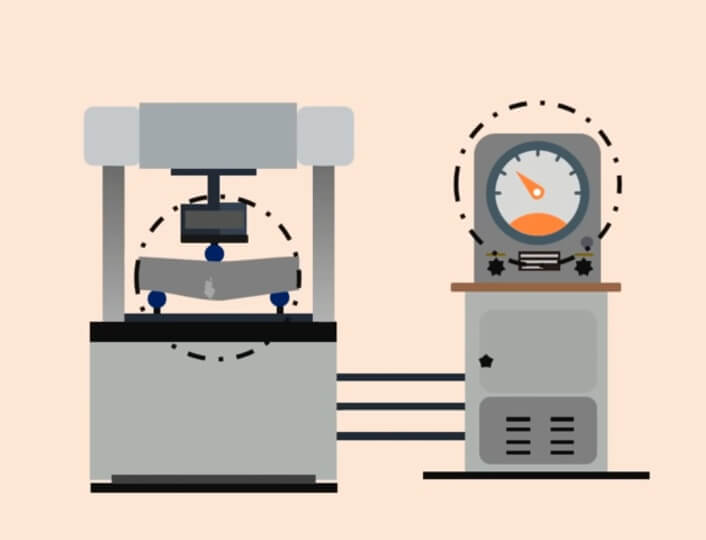
The load is applied at the rate of loading of 400kg/min for 150mm specimen and at rate of 180kg/min for 100mm specimen.
Note down the load at which concrete specimen fails by developing cracks.
Now measure the distance between line of fracture and nearest support. Consider this “a”.
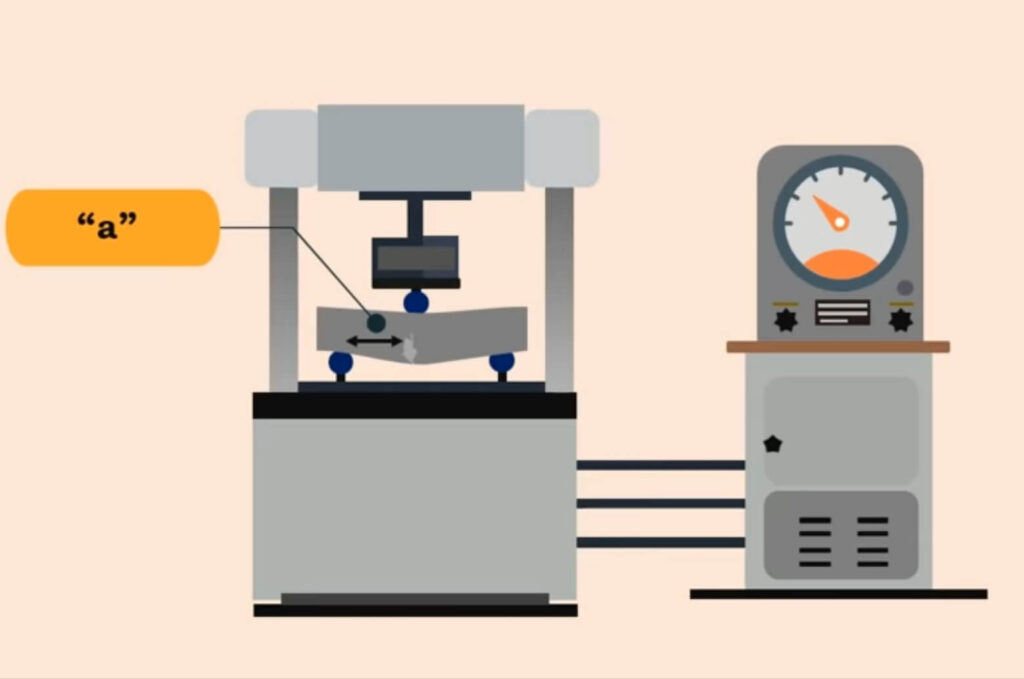
If a>200mm for 150mm specimen or a>130mm for 100mm.
Flexural strength or modulus of rupture should be
Fb = (P x L) /(bd^2)
If a<200mm & a>170mm for 150mm specimen or a<133mm & a>110 for 100mm specimen
Flexural strength or modulus of rupture should be
Fb = (3Pa) /(bd^2)
Where, b = width of the beam in mm
d= failure point depth in millimeter
L= supported length in millimeter
P = maximum load applied to the beam in kilograms.

